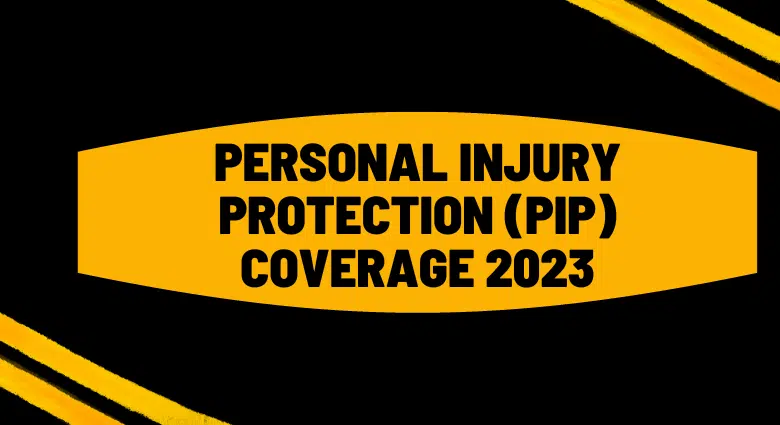Personal Injury Protection (PIP) Coverage 2023

Personal Injury Protection (PIP) Coverage 2023
Welcome to the future of Personal Injury Protection (PIP) Coverage! As we enter into 2023, it’s important to understand how this type of insurance will impact your life and protect you in unexpected situations. PIP coverage is a vital aspect of any insurance policy that provides medical expenses and lost wages for those involved in an accident. In this blog post, we’ll explore what PIP coverage entails, its benefits, and why you should consider adding it to your insurance plan. Get ready to learn everything you need to know about PIP coverage as we prepare for the year ahead!
Are you familiar with Personal Injury Protection (PIP) coverage? It’s an important aspect of auto insurance that can provide financial assistance if you’re ever involved in a car accident. As we approach 2023, it’s crucial to understand the ins and outs of PIP coverage and how it may impact your policy. In this blog post, we’ll break down everything you need to know about PIP coverage and why it’s essential for every driver on the road. So buckle up and let’s dive into the world of PIP insurance!
What is Personal Injury Protection (PIP)?
If you’re injured in an accident, Personal Injury Protection (PIP) can provide financial protection. Under PIP, your health insurance pays for most of the costs of your medical care and lost wages while you’re recovering. Plus, PIP may cover some expenses related to your vehicle, such as rental car fees or damage to your vehicle.
To be eligible for PIP, you must have comprehensive coverage through your job or through another source. You don’t need to use PIP if you have health insurance that covers medical expenses and lost wages.
To file a claim under PIP, contact your health insurance company or the claims center for the personal injury protection program of your state’s attorney general.
When is PIP Coverage Available?
When PIP coverage is available, it will typically provide benefits for medical expenses, lost wages and pain and suffering. The amount of benefits that you are eligible to receive will depend on your state’s laws and the amount of PIP coverage that you have. Typically, the sooner you file a claim, the more money you will receive.
PIP coverage is available when you’re injured or have a health condition. PIP can help pay for medical expenses, lost wages, and other damages you may experience due to an accident.
To qualify for PIP, you must have a qualifying injury or health condition. A qualifying injury is an accident-related injury or illness that’s covered under your personal insurance policy. A qualifying health condition is a medical condition that’s covered under your personal insurance policy.
To find out if PIP coverage is available to you, call your insurance company. You may also be able to find information about PIP coverage online.
How Much Does PIP Coverage Cost?
PIP coverage is designed to help you financially recover from injuries that you may suffer while on the job. The cost of PIP coverage depends on a number of factors, such as your state’s rates and the amount of benefits that you are eligible for. Generally, PIP costs around $30 per month.
PIP coverage is a type of insurance that can help pay for medical expenses if you are injured in an accident. The cost of PIP coverage can vary depending on your policy, but it typically costs around $100 per month.
Who is Covered by PIP?
Personal Injury Protection (PIP) is a type of insurance that provides benefits for people who are injured while on the job. PIP coverage can help cover medical expenses, lost income, and other costs associated with an injury.
PIP coverage is most commonly offered to employees of companies with at least 50 employees. However, PIP coverage is also available to individuals who are self-employed or work for small businesses. PIP coverage can also be added onto car insurance policies.
To be eligible for PIP coverage, you must have worked for your employer for at least 30 days in the 12 months before your injury. You must also have been employed at the time of your accident and have been covered by your employer’s workers’ compensation insurance policy.
If you are injured while not working, you may be able to get benefits from PIP coverage if your injury meets certain criteria. For example, you must have been injured while performing your employment duties and the accident must have caused a physical impairment that prevented you from returning to your job.
What are the Requirements for PIP Coverage?
In order to be eligible for PIP coverage, you must meet certain requirements. These requirements vary depending on the state in which you reside, but generally, you must have minimum income and be covered by health insurance. In some cases, you may also need to have been injured in an accident.
PIP coverage typically pays benefits for medical expenses, lost wages, and other costs related to your injury. To be eligible for PIP coverage, your injuries must be related to the accident that caused your insurance policy to start. This means that if you suffer a unrelated injury while your policy is in effect, PIP may not cover those expenses.
There are a few exceptions to this rule. For example, PIP may cover expenses if you are temporarily unable to work as a result of your injury. Additionally, PIP may cover some costs associated with pregnancy or childbirth.
How Often Does PIP Coverage Renewal Occur?
Most personal injury protection (PIP) policies are automatically renewed each year, unless you notify the insurance company in writing of your desire to discontinue coverage. If you have not notified the insurance company of your intent to discontinue coverage, PIP will generally continue for 12 months from the date of your policy’s expiration.
If you have any questions about upcoming PIP renewal, please contact your policy issuer or an insurance agent.
Conclusion
Thank you for reading our article on Personal Injury Protection (PIP) Coverage in 2023. In today’s world, it is important to be fully protected if you suffer an injury. With PIP coverage, you can rest assured that your medical bills will be covered regardless of who is at fault. Our article provides a detailed overview of PIP coverage and what changes we may see in the next year or so. If you have any questions about PIP coverage or would like to know more about how we can help protect your interests, please do not hesitate to contact us at [PHONE NUMBER]. We look forward to hearing from you soon!




